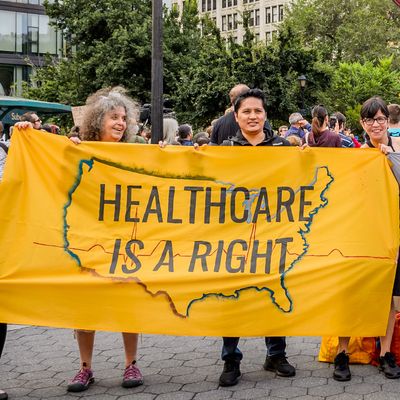
Thirty-four million Americans say they know someone who died after they could not afford medical treatment during the last five years, a joint poll by Gallup and West Health reported on Tuesday. Rates are highest among households making less than $40,000 a year; the poll also shows a massive racial gap. Just over 20 percent of nonwhites say a friend or family member died after being unable to pay for care. That figure shrinks to 9.6 percent for whites. Most are also young: ages 45 and under. A further 58 million people say they have personally been unable to pay for medication at least once during the last 12 months.
Gallup’s results are new, but they confirm the existence of a long-standing problem. America’s heavily privatized health-care system is too expensive and burdens vulnerable households in particular. Twenty-six percent of patients with diabetes say they’ve rationed their insulin in the past year, the T1 International advocacy group reported in June; another 38.6 percent say they’ve had to ration their blood-glucose monitoring strips. “I can’t afford a home. Most of my salary goes toward diabetic supplies. I have to ration everything,” one patient told the group. When people have to ration their insulin, they get very, very ill — and some die, as previously reported by Intelligencer.
Insulin rationing isn’t the only sign of a health-care system in crisis, but it’s a powerful barometer. People with type 1 diabetes can’t live without insulin, but the barriers to care are so steep they can’t consistently access a medication they need to stay alive. Though Gallup doesn’t specify which medications its respondents say they can’t afford, insulin is almost certainly one of them. While rationing insulin is very dangerous, broad swathes of the American population say they’ve delayed other forms of basic preventative care. In 2018, a survey published by Harris Poll and Earnin.com, a financial website, showed that over half of all Americans delayed care over the last year because of the expense. Nearly a quarter said they’d delayed care for the same reason longer than a year. Perhaps it’s not a mystery, then, why the Centers for Disease Control reported in 2018 that the average American lifespan has declined for the second time in three years. An increase in the number of deaths from suicide and drug overdose contributed to the trend. A health-care system that can’t guarantee access to insulin is hardly equipped to facilitate access to psychiatric care and medication-assisted treatment for substance-use disorders.
Put Gallup’s data together with these older findings, and an unflattering portrait of America emerges. Income inequality hit a 50-year high this year, lifespans are getting shorter, and people are dying because they can’t access life-saving care. The situation isn’t that dissimilar from the economic conditions that sent Chileans out into the streets to protest. There’s no widespread unrest in the U.S. yet, though voters consistently rank health care as one of their top electoral concerns. But without radical change, American quietude will likely someday end.






























